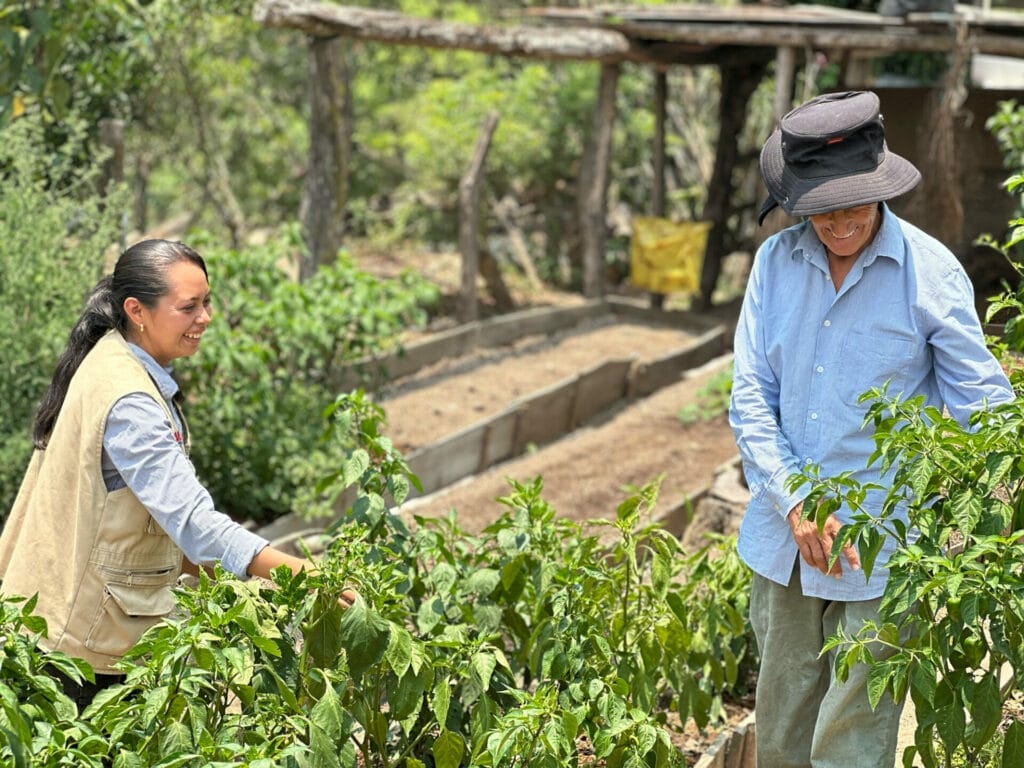News > Blog
Cultivating New Leaders, Healthier Futures through Family Gardens
Published 11/14/2024 by Global Communities

San Francisco de Cones is a peaceful mountain village in Honduras known for its year-round temperate climate and fertile land, ideal for growing beans, corn and coffee. Most residents rely on growing the food they consume and, until recently, there was always enough to sustain them. However, over the past five years, frequent landslides, winter floods and summer droughts have made it increasingly difficult to live off the land. This is where 25-year-old Glendy Murcia lives with her three children.
With support from the United States Agency for International Development’s Bureau for Humanitarian Assistance (USAID/BHA), through the Honduras Agricultural System Support (HASS) program, Glendy has seen her life flourish in ways she never anticipated. And it all started with a family garden.
Before participating in the HASS program, Glendy had to travel almost 14 miles to the nearest town to buy produce. Now, thanks to resources and training she received through HASS, a variety of fresh vegetables are literally at her fingertips. Every morning, she and her family get up early to water and take care of the land. With the daily harvest, Glendy is able to feed her children in a healthier and more sustainable way, significantly improving their quality of life and future.
Before, we had to wait for a car to come to the community once a week to buy vegetables or make a trip to the town. But since I have the family garden, I have fresh vegetables every day.”
Glendy, HASS program participant

In addition to improving her household’s nutrition, Glendy uses the leftover harvest from her garden to earn extra income. She sells the produce to community members and even inspired other women with gardens to follow her example. Together, they created a messaging group that allows them to coordinate sales to meet the area’s demand. With the income generated from these sales, Glendy purchased a variety of seeds to diversify her garden. Now, she grows everything from carrots and tomatoes to cucumbers, onions, green beans and radishes. Profits have also enabled her to cover her children’s school expenses.
Access to resources such as home gardens is especially significant for women, as it opens up new opportunities for entrepreneurship, income generation and family support.
In this sense, Glendy’s leadership and initiative did not go unnoticed. Her commitment and skills led to her selection as a volunteer agricultural collaborator with the HASS program. In this role, she advises and supports other small-scale farmers, ensuring they correctly apply the techniques learned during training. She also provides guidance on crop management, among other tasks.

Glendy says this new role has empowered her and changed the trajectory of what she believes is possible for her life. She is motivated to continue her studies, convinced that education will open up new opportunities and guarantee a better future for her and her family. For Glendy, it’s not just about achieving her own goals but about being an example for her children. She wants them to grow up knowing that, with hard work and dedication, it is possible to change the course of their lives.
“My greatest satisfaction is to hear my children tell me they are proud of what I have achieved,” she says. “Also, thanks to this project, I was able to discover the leader inside me. People in my community now recognize me, and there are other organizations that have approached me to support them.”
Since working as a volunteer agricultural collaborator, Glendy has had the opportunity to manage clean-up campaigns, exchange seeds among the women who have gardens, and inspire others to transform their dreams into achievable realities. Organizations outside of the HASS program have even offered her internships to strengthen her skills as a community leader. Her dedication and success are a prime example of how women — when given the right opportunities and resources — can transform their lives through agricultural work and entrepreneurship.




